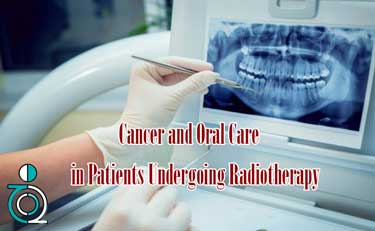
2025-10-15
Cancer and Oral Care in Patients Undergoing Radiotherapy
Dr. Amir Mohammad Aloumi – Dentist
Cancer is one of the most common diseases of the modern era, and its treatment usually involves methods such as surgery, chemotherapy, and radiotherapy. Although radiotherapy plays a vital role in controlling tumors, it can also affect the surrounding healthy tissues, including the mouth and jaw. Awareness of these effects and adherence to proper oral care can prevent many serious complications.
Common Oral Complications During or After Radiotherapy
Radiotherapy in the head and neck area may cause various changes in the mouth, including:
1. Dry mouth (Xerostomia):
Reduced saliva secretion increases the risk of tooth decay, difficulty swallowing and speaking, and a burning sensation in the mouth.
2. Mucositis (Oral Mucosal Inflammation):
Painful ulcers and inflammation in the mouth that reduce appetite and cause pain during eating.
3. Altered Taste Perception:
Some patients lose the ability to taste sweetness or saltiness, or experience changes in taste.
4. Fungal Infections (Candidiasis):
With reduced saliva and oral immunity, natural oral fungi overgrow, causing painful white or red patches.
5. Osteonecrosis of the Jaw:
A late and serious complication usually caused by infection or surgery after radiotherapy, requiring prompt treatment.
Dental Procedures Before Starting Radiotherapy
Before beginning radiotherapy, the patient should visit a dentist for a thorough oral examination. The following steps are essential:
• Treatment of decayed or infected teeth
• Scaling and improvement of oral hygiene
• Instruction on the use of alcohol-free mouthwashes
• Protection of healthy tissues
• Complete dental imaging to identify hidden problems
Oral Care During and After Radiotherapy
During and after treatment, oral hygiene must be maintained with great care:
• Gentle brushing with a soft toothbrush and fluoride toothpaste
• Use of alcohol-free mouthwash or warm saline rinses
• Drinking plenty of water and using artificial saliva or sugar-free gum to reduce dryness
• Avoiding smoking, alcohol, and spicy or acidic foods
• Eating soft, warm, high-calorie foods to maintain energy
• Regular dental check-ups every three months to monitor oral health
Important Points for Patients
Patients undergoing radiotherapy should pay close attention to minor changes in their mouth. Key points include:
• Report any unusual dryness or burning sensation in the mouth to your doctor.
• Any ulcers lasting more than two weeks should be examined.
• Gum bleeding, loose teeth, or jaw pain may indicate infection or osteonecrosis.
• Discoloration or thickening of oral tissues may signal late complications or disease recurrence.
• Pain when opening the mouth or swallowing should be evaluated by a dentist or oncologist.
Conclusion
Oral care in cancer patients is not merely part of treatment—it is essential for maintaining quality of life and preventing serious complications. Close cooperation between the dentist, radiotherapy specialist, and the patient is key to success.
Following simple but effective recommendations allows patients to complete their treatment with less pain and better overall health.
/End of message
Charity Foundation of Special Disease
@cffsd